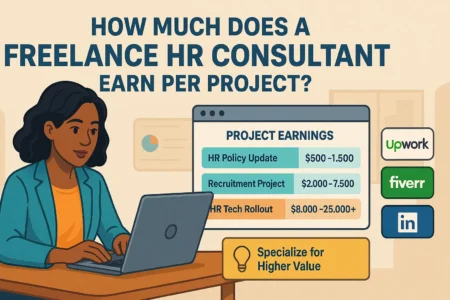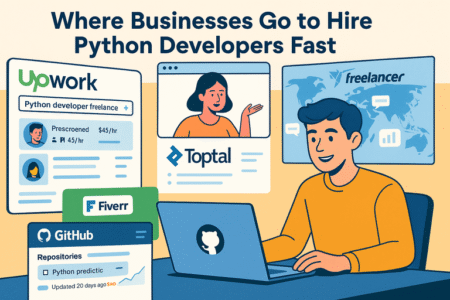Table of Contents
A freelance full stack developer can be the secret weapon your business didn’t know it needed. With the ability to handle both front-end and back-end development, they bring versatility that few other roles can match.
But why are more businesses turning to freelancers instead of traditional hires? Is it simply about cost, or is there something deeper in the way they unlock growth and flexibility?
Let’s dig into the reasons and uncover how this choice could transform your projects.
Cost-Effective Alternative to Traditional Hiring
Hiring a freelance full stack developer is often the smarter financial move compared to bringing on a full-time employee. Instead of committing to a salary, benefits, and office resources, you can pay only for the work you need.
That kind of flexibility changes the game, especially for startups and small businesses.
Reduce Overhead With Flexible Contracts
One of the biggest advantages of going freelance is the freedom from long-term commitments. With employees, you’re locked into payroll, healthcare, retirement plans, and sometimes even office space. With freelancers, you set clear project terms and only pay for actual hours or deliverables.
For example, if you need someone to build a new feature on your web app, you can contract a freelance developer for just that scope. Once it’s complete, the financial relationship can pause until you need them again. No idle salaries. No wasted resources.
I often suggest writing milestone-based contracts, where payment is tied to specific deliverables. This ensures accountability while keeping costs predictable.
Eliminate Recruitment and Training Expenses
Recruiting an employee isn’t just expensive—it’s time-consuming. Job postings, interviews, onboarding, and training all eat up valuable resources. A freelance developer, on the other hand, is usually project-ready.
Most freelancers are self-starters. They’ve worked with multiple clients, adapted to different systems, and know how to get up to speed quickly. Instead of investing weeks in training, you can plug them directly into your workflow.
I’ve seen businesses save thousands of dollars simply by skipping the recruitment treadmill and hiring someone ready to contribute from day one.
Scale Development Costs Based on Project Needs
With freelancers, you’re in full control of your budget. Need more help during a busy season? Bring them in. Want to slow down after a big release? Scale back.
This elasticity is powerful for startups, where project demands fluctuate constantly. I once worked with a company that only needed heavy dev support during quarterly product pushes.
By using freelancers, they managed to cut annual development costs by almost half while still shipping on schedule.
If you’re tired of rigid payrolls eating into your margins, this is one of the clearest ways a freelance full stack developer can become your financial secret weapon.
Access to a Broader Talent Pool
When you hire locally, your options are limited to whoever happens to be nearby. Freelance developers erase those borders, giving you access to a global market of talent.
That means you can find the exact skills you need without compromise.
Find Specialists With Niche Skills on Demand
Sometimes you don’t just need “a developer”—you need someone who knows Django, or Tailwind, or can integrate Shopify with a custom API. Those specialists aren’t always sitting in your city waiting for a job posting. But in the freelance market, they’re just a search away.
I’ve hired freelancers who could deliver highly specialized solutions in days that would’ve taken a generalist weeks to figure out. Think of it as hiring a surgeon instead of a general doctor when the situation calls for it.
Tap Into Global Expertise Without Location Barriers
Time zones stop being a problem when you use them to your advantage. Imagine assigning tasks at the end of your workday and waking up to see them completed. This “follow-the-sun” workflow is only possible when you’re not restricted to local talent.
Plus, you’re no longer stuck paying inflated rates based on geography. You can find developers in regions where costs are lower but skills are just as sharp. That’s not cutting corners—that’s smart resourcing.
Hire Developers Who Stay Updated With Latest Tech
Freelancers survive by staying sharp. If they don’t keep up with new frameworks, tools, and best practices, they’ll get left behind in a competitive market.
That means when you hire a freelance full stack developer, you often get someone more up-to-date than an in-house employee who’s stuck in routine tasks.
For instance, I’ve seen freelancers recommend new serverless solutions or no-code integrations that dramatically reduced development time and hosting costs.
If you want to stay competitive, having access to fresh, current expertise is invaluable.
Faster Project Turnaround and Agility
Businesses thrive on speed. The faster you can deliver a product, update, or feature, the faster you can win customers. Freelance full stack developers are uniquely positioned to speed up your development cycles.
Work With Developers Who Can Handle Entire Projects
One of the biggest time-killers in development is handoff between front-end and back-end teams. A full stack freelancer eliminates that problem by bridging both worlds.
Need an interactive dashboard built from scratch? A freelancer can set up the database, build the API, and design the UI—all without waiting for separate teams. That continuity saves days, if not weeks.
Minimize Dependencies Between Multiple Roles
When you rely on a large team, small dependencies can cause big bottlenecks. If the back-end team is waiting on front-end input—or vice versa—progress stalls.
Freelance full stack developers reduce that dependency web. They can move a project forward independently, checking in for feedback only when necessary.
This autonomy is one of the reasons projects often feel smoother when run through a single developer instead of a committee.
Quickly Adapt to Changing Project Requirements
We’ve all had it happen: Mid-project, the scope changes. A new feature is requested. A different framework is needed. Maybe the client rethinks the entire flow.
Freelancers, especially full stack ones, are used to adapting. They’re used to clients pivoting, to features shifting, and to deadlines moving. Their entire business model is built around agility.
I’ve seen freelancers pivot from React to Vue mid-project without blinking, or swap out databases when scaling became an issue. This kind of adaptability is priceless compared to the inertia you often see in larger teams.
Pro Tip: If you want to maximize speed and flexibility with a freelance full stack developer, start with a clear project scope but keep communication open. Agile methods—short sprints, quick check-ins, and iterative releases—work beautifully with freelancers who thrive on adaptability.
One Person, Multiple Skill Sets
A freelance full stack developer is like having a Swiss Army knife in your toolkit. Instead of juggling multiple hires to cover design, back-end, and front-end needs, you get someone who can handle it all.
This blend of skills can save time, reduce friction, and make your projects flow much more smoothly.
Benefit From Seamless Front-End and Back-End Integration
When you hire separate front-end and back-end developers, one small miscommunication can snowball into delays.
The front-end dev might design an interactive dashboard, but if the back-end isn’t structured properly to support it, you’ll be stuck waiting for adjustments.
A full stack freelancer eliminates that dance. They’re able to architect the database, build the APIs, and ensure the interface works flawlessly with the back-end logic—all without waiting for someone else.
It’s like having one brain managing the whole process, rather than two trying to stay in sync.
I once worked with a freelancer who built a booking system for a client. Instead of splitting the work, they handled both the UI calendar design and the database logic behind it.
The end result? The front-end and back-end were so tightly integrated that the system ran smoothly from day one, with fewer bugs and much faster delivery.
Get a Developer Who Understands Both Design and Functionality
A full stack developer won’t just make the code work—they’ll also understand how it feels to the user. That’s a big difference. Too often, projects suffer because the design looks nice but doesn’t function properly, or the functionality is there but feels clunky.
A freelancer with skills on both ends balances aesthetics with practicality. For example, they know that a “fancy” animation could slow down the site load speed, so they’ll suggest a lighter alternative that still looks good but performs better.
They see the bigger picture—how design impacts usability, and how the back-end impacts performance.
I suggest always asking your developer to walk you through both their design choices and their technical setup. If they can explain both clearly, you know you’re in good hands.
Simplify Communication With a Single Point of Contact
Here’s the underrated perk: You don’t have to manage two or three people. Instead of acting as a middleman between front-end, back-end, and maybe even a designer, you just talk to one person.
That cuts down endless Slack threads, confusing email chains, and finger-pointing when something breaks. You can set expectations, discuss goals, and get updates directly without worrying about wires getting crossed between team members.
If you’ve ever had to sit in a meeting where developers argued over whose code broke the system, you’ll understand the value of one person owning the entire stack.
Innovation and Fresh Perspectives
Freelancers don’t live in the bubble of a single company’s processes or outdated tech stacks. They’re constantly moving between industries and projects, which gives them a knack for bringing in fresh, innovative solutions.
Bring Outside Creativity Into Your Development Process
When you work with an in-house team for years, projects can start to feel repetitive. Processes get locked in. “This is how we’ve always done it” becomes the default. A freelancer can disrupt that pattern in the best possible way.
Because they’ve seen different problems—and different ways of solving them—they can suggest creative approaches you might never have considered.
For example, I once saw a freelancer recommend integrating a third-party no-code tool into a custom project. It cut the development time in half and saved thousands in costs.
That kind of fresh perspective doesn’t just speed things up; it sparks new ideas for the business itself.
Leverage Experience Across Different Industries
Freelancers often jump between startups, agencies, and enterprise projects. That diversity of experience becomes your advantage.
Maybe they’ve built a payment gateway for an e-commerce platform and can apply those lessons to your SaaS subscription model. Or perhaps they’ve worked on a healthcare project where security was paramount and can bring that same rigor to your app.
When you hire a freelance full stack developer, you’re not just buying skills—you’re buying the experience of every project they’ve touched.
Adopt New Tools and Frameworks Faster
Freelancers live and die by their ability to stay current. If they fall behind, clients move on to someone sharper. That’s why they’re often among the first to adopt new frameworks, libraries, or deployment strategies.
I’ve had developers recommend moving to serverless infrastructure or trying lightweight frameworks like Svelte before they were mainstream. Early adoption gave us faster load times and cheaper hosting long before competitors caught on.
This agility is something you rarely get with in-house teams that stick to the same old tech stack year after year.
Flexibility for Short-Term and Long-Term Needs
Business needs don’t stay static. Some months you’re sprinting on a new feature release, other times you just need small updates and maintenance. Freelance full stack developers give you the ability to adapt without HR headaches.
Engage Freelancers for One-Off Projects or Ongoing Work
Not every business wants or needs to commit to a full-time developer. Maybe you just need a landing page, a quick app feature, or help migrating databases. Freelancers thrive on these one-off, scoped projects.
But if you find someone you really trust, you can also keep them on retainer for ongoing updates or as an “on-call” developer for emergencies.
I’ve seen businesses use freelancers almost like an outsourced CTO—someone they don’t pay full-time but can call when tech strategy is needed.
Scale Teams Up or Down Without HR Complications
Hiring and firing employees is complicated, expensive, and often emotionally draining. Scaling with freelancers avoids that mess.
Need three developers for a three-month sprint? Hire them. Done with the project? Let them finish their contract, and you’re not stuck with ongoing payroll.
This kind of scaling is a lifesaver for startups. It lets you run lean during quiet times and go full throttle when opportunity knocks.
Balance Freelancers With In-House Teams Strategically
It’s not about replacing employees—it’s about complementing them. Some companies use freelance developers as “special ops” for projects that need to move quickly while the in-house team handles long-term maintenance.
This balance keeps everyone focused on what they do best. Your team isn’t overwhelmed with urgent projects, and freelancers bring in energy and specialized skills when needed.
From what I’ve seen, this hybrid approach is the sweet spot. You get the stability of an internal team and the flexibility of freelancers without burning out either side.
Pro Tip: If you’re considering a freelance full stack developer for long-term work, set up a simple recurring agreement (like a set number of hours per month). It gives you reliable access without the full-time commitment, and the developer stays motivated because they know work is steady.
Proven Efficiency for Startups and Small Businesses
Startups and small businesses don’t have the luxury of endless resources. Every hire, every tool, and every decision matters.
This is exactly where a freelance full stack developer becomes your secret weapon: Someone who brings big-league skills without the heavyweight costs.
Get Enterprise-Level Skills Without the Full-Time Salary
Hiring a full-time developer with experience across multiple stacks can cost six figures a year, not including benefits, insurance, and equipment. Most early-stage businesses simply can’t afford that.
Freelancers level the playing field. You can hire a developer who has worked on enterprise-level projects but only pay for the hours or deliverables you need.
For example, I’ve seen small e-commerce shops hire a freelancer to integrate advanced payment systems and security protocols—something usually reserved for big companies.
The outcome? They got world-class functionality without committing to a huge payroll expense.
I’d argue this is one of the smartest hacks for early-stage companies: get premium expertise on a project-by-project basis.
Prioritize Budget on Growth Instead of Overhead
Every dollar you spend on staff overhead is a dollar you’re not spending on product, marketing, or customer acquisition. That’s the harsh truth for startups.
Freelancers free up that budget. Instead of a fixed monthly salary draining your runway, you can invest in areas that push growth directly.
If you’re building an MVP (minimum viable product), you can pour money into development for two months, then redirect funds toward user testing or ads the next.
That agility in budgeting is what lets small teams punch above their weight.
Align With Developers Who Understand Startup Culture
Not all developers thrive in the fast-moving, unpredictable world of startups. But freelancers? Many of them live for it.
They’re used to jumping into new projects, working lean, and adapting on the fly. They know how to ship fast, break things, and fix them just as quickly.
I’ve met freelancers who’ve helped launch multiple startups in different industries. That kind of mindset is invaluable because they already understand the chaos, the pivots, and the urgency.
If you’re a small team trying to do more with less, having a developer who “gets it” isn’t just helpful—it’s critical.
Risk Mitigation and Project Security
Working with a freelance full stack developer isn’t just about speed and cost savings—it’s also about reducing risks that come with traditional hiring.
When managed properly, freelancers can actually make your projects more secure and more predictable.
Reduce Delays Caused by Employee Turnover
Employee turnover is a nightmare for projects. Imagine training someone for months only to have them leave mid-project. You’re back to square one, bleeding time and money.
Freelancers sidestep this issue. You’re not relying on someone’s long-term employment. If one freelancer moves on, you can bring in another without the HR drama of replacing a staff member.
In fact, many businesses maintain a “bench” of trusted freelancers they rotate between to keep projects moving smoothly.
This flexibility keeps projects on track, even if individuals change.
Use Contracts and Milestone Payments for Accountability
One of the best things about working with freelancers is that you can build accountability directly into your contracts. Instead of hoping an employee is productive day to day, you tie payments to results.
For example:
- Payment 1 after setting up the database.
- Payment 2 after API integrations are complete.
- Payment 3 upon final delivery and testing.
I recommend always working this way. It gives you control over the process and ensures the freelancer stays motivated to deliver on time.
Maintain Control of Source Code and Project Direction
One mistake I’ve seen small businesses make is letting developers control the source code without oversight. With freelancers, you can set rules upfront: code must be stored in your GitHub repository, and access is revoked when the project ends.
This way, you keep control of your intellectual property and ensure nothing walks out the door. A freelance full stack developer who’s professional will have no issue with this—it’s standard practice.
By being intentional about ownership and structure, you can actually reduce risk compared to a traditional hire who might leave and take knowledge with them.
Building Long-Term Partnerships With Freelancers
The beauty of working with freelancers isn’t just in the short-term wins. Over time, many businesses build trusted partnerships that feel just as reliable as an in-house team—sometimes even more so.
Create Consistency With Trusted Repeat Collaborators
Once you’ve found a freelancer you trust, you don’t need to start fresh every time. They already know your product, your processes, and your style. Each new project builds on that foundation, so the workflow gets smoother and faster.
I’ve seen businesses stick with the same freelancer for years, treating them almost like part of the family. That consistency means fewer onboarding headaches and better results over time.
Develop a Reliable Go-To Resource for Scaling Projects
Think of a freelancer as your “on-call” developer. When your team gets overwhelmed or a new project drops out of nowhere, you already have someone who can jump in and help.
This is particularly useful for scaling. If your user base suddenly spikes and you need to optimize servers or roll out new features, a freelancer who knows your system can hit the ground running. No scrambling to find someone new under pressure.
Strengthen Communication and Workflow Over Time
Working with a freelancer for the long term means communication gets easier. They learn how you like updates, whether you prefer Slack pings or weekly reports. They start anticipating your needs and suggesting improvements before you even ask.
Over time, this relationship turns into something more like a partnership than a transaction. And that’s when the magic happens—projects move faster, ideas flow more freely, and trust builds naturally.
Pro Tip: Don’t think of freelancers as temporary helpers. If you treat them like true partners, invest in clear communication, and keep the relationship professional, you’ll build a network of trusted collaborators who are always ready when you need them.






